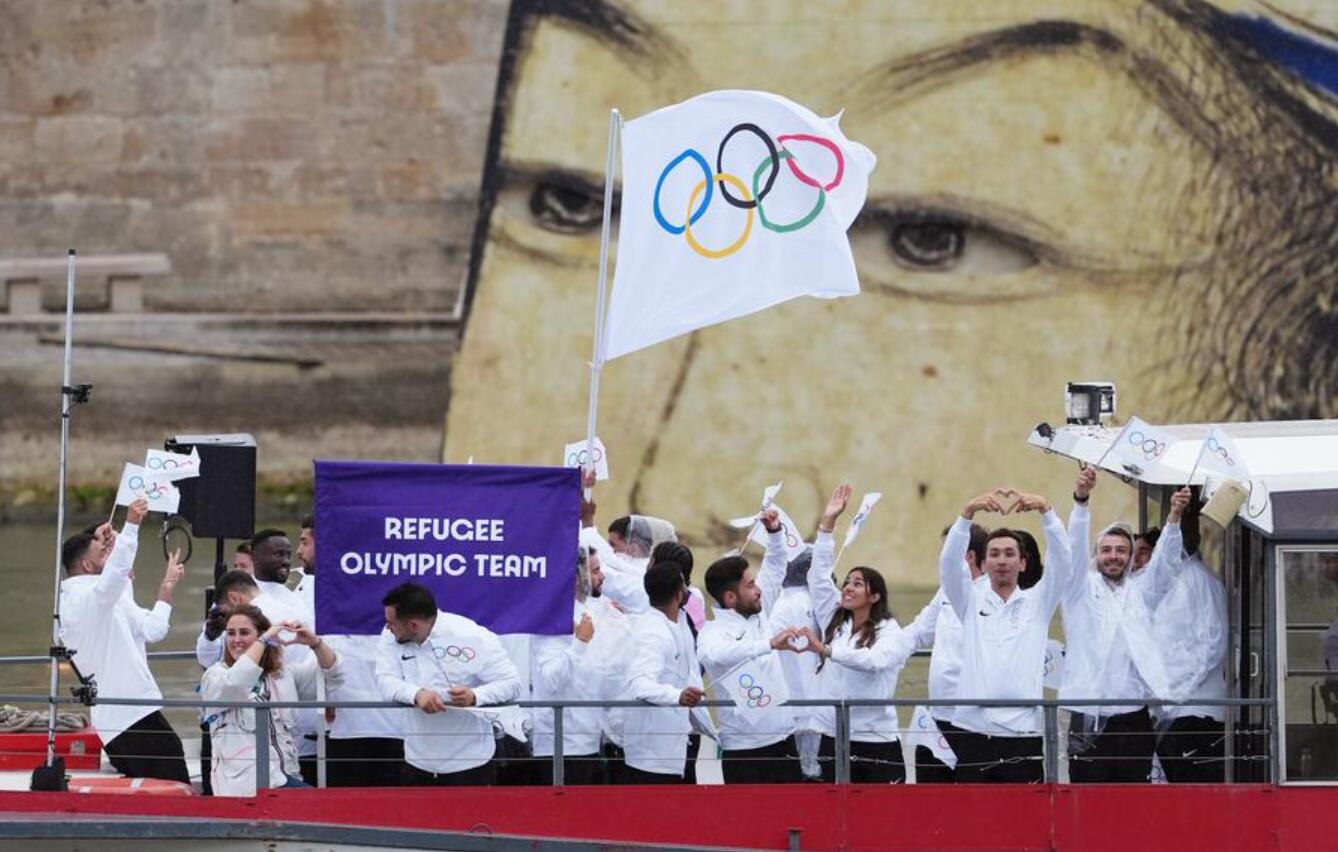
 0 Comment(s)
0 Comment(s) Print
Print E-mail Xinhua, August 14, 2024
E-mail Xinhua, August 14, 2024
From the team's first-ever medal to its final appearances and some personal bests, refugee athletes at the Paris Olympics showcased their determination and the power of sport to transform lives.
A fortnight-long celebration of sports in Paris that began with smiles in the rain on the Seine ended with joy and pride for the Refugee Olympic Team, including its first-ever Olympic medal.

Members of the Refugee Olympic Team attend the opening ceremony of the Paris 2024 Olympic Games in Paris, France, July 26, 2024. (Xinhua/Jiang Wenyao)
The Refugee Olympic Team, which made its inaugural appearance at Rio 2016, was established by the International Olympic Committee (IOC) and the Olympic Refuge Foundation (ORF) - with support from UNHCR, the UN Refugee Agency - to give forcibly displaced athletes the chance to showcase their talents on the highest sporting stage.
"These refugee athletes have overcome immense challenges, but their success is a reminder to the world of what can be achieved when refugees are given a helping hand to pursue their dreams," said Deputy High Commissioner for Refugees, Kelly T. Clements, who watched the team take part in the Paris 2024 closing ceremony on Sunday.
"After a historic Games for the Refugee Olympic Team, we can certainly say that these 37 athletes have demonstrated what refugees can achieve if they have the opportunity to thrive," said Jojo Ferris, Head of the Olympic Refuge Foundation.
Boxer Cindy Ngamba won bronze in the women's 75kg category, becoming the first member of the Refugee Olympic Team to take to the podium.
In athletics, Dominic Lokinyomo Lobalu came within a fraction of a second of a medal in the men's 5,000-metre final on Saturday, finishing fourth. Earlier in the Games, Perina Lokure Nakang and Jamal Abdelmaji both ran personal bests in their races, the women's 800m and men's 10,000m respectively.
On the water, three refugee canoe sprinters reached the quarterfinals: Fernando Dayan Jorge Enriquez in the men's canoe 1,000m, Saeid Fazloula in the men's kayak 1,000m, and Saman Soltani in the women's kayak 500m.
But no matter where they finished in competition, every member of the 37-strong Refugee Olympic Team displayed tremendous determination and courage across their 12 different sports at Paris 2024, flying the flag for the 120 million forcibly displaced people worldwide.
At Tokyo 2020, 29 refugee athletes competed, including road cyclist Masomah Ali Zada, who led the Refugee Olympic Team in Paris as its Chef de Mission and spokesperson. For the opening ceremony in Paris, the team's flag bearers were Ngamba and Yahya Al Ghotany, who competed in taekwondo.
The team was represented during the Closing Ceremony by flagbearers Farida Abaroge and Kasra Mehdipournejad. Ngamba also took to the stage alongside IOC President Thomas Bach, French swimmer Leon Marchand and athletes representing the five participating continents to extinguish the Olympic flame, marking the end of the Games.
In addition to those competing under the IOC Refugee flag, other sportsmen and sportswomen also underscored the strength and resilience of displaced people, proving they can reach the highest levels when given the opportunity and support.
Among them, Kimia Alizadeh - a member of the Refugee Olympic Team in Tokyo who now competes for Bulgaria - claimed the country's first-ever medal in taekwondo, winning bronze in the women's 57kg category.
Meanwhile, South Sudan's men's basketball team - made up of former refugees including UNHCR supporter Wenyen Gabriel - represented the African continent in Paris, beating Puerto Rico before losing out to Serbia and the United States in a tough group.
From the Opening Ceremony through every bout, race competition and personal best, to the podium itself, the Refugee Olympic Team showcased the power of sport to inspire, uplift and provide hope to other displaced people.
"As the Olympic flame is extinguished here in Paris, the legacy of the Refugee Olympic Team will continue to inspire us all," Clements concluded.
Go to Forum >>0 Comment(s)